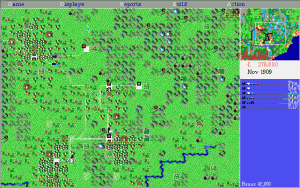212th played so far
 Genre: Management Simulation
Genre: Management Simulation
Platform: PC
Year of Release: 1990
Developer: MicroProse
Publisher: MicroProse
A disadvantage of looking at statistics when determining games to play is that there are genres where we have to wait a long time before we feel (statistically) able to play them. Due to a missed connection over Flight Control‘s genre it took us even longer for us to be able to play another management simulator (and now, because of the theme of games 201-250, it is going to be even longer before we can think of playing Theme Park).
Okay, so I don’t agree that Flight Control counts as management sim but The Movies sure is. It may not be completely the right time to play this… but I have wanted to play this for ages.
Our Thoughts
Like most young boys I had a train set. It wasn’t a particularly complex one, in fact it was a wooden one like you would find in the Early Learning Centre, but it was enough to help me create a imaginary world with bridges and interchanges where everything can slot into place.
If you are going into Railroad Tycoon with the idea that you are going to be able to replicate the experience you had as a child then you really have another thing coming. For one thing this game really does take the tycoon element seriously and that is not a bad thing at all. As is the fact with all railway companies the chief concern is money, this will also become your main concern since it is rather easy to run out of money and find yourself in the red. It is all too easy to find yourself in the red and things become rather repetitive because of it.
Then again, if you start small and manage your money through upgrades you are less likely to have this problem. However, your coffers are still filled or emptied at the will of your stockowners. If there is (randomly generated) bad news then you will find yourself out thirty grand and unable to purchase that section of track required to make use of a rubber plantation. It probably is not that realistic to be honest but at times it really feels like it and that it really what matters in computer games.
What doesn’t help here is that you don’t really have a chance to make small upgrades – at least not early on in the game. Railways are relatively expensive to build and the various types of stations are even more so – and those lines are useless without them. Which means, in extreme cases, that your line is expensive and when you reach the end, you don’t have the money to build it – and hence make use of that expensive line. Getting the money for it can take a lot of time, and all that time there’s nothing you can do…
One thing that detracts from that realism is the interface and the graphics which are basic when compared to games like John Madden Football which came out in the same year. Still, the graphics are excusable but the interface is abominable. It took a lot of Google and trial and error to figure out how to play the game properly and even then some things (like how to branch out rails) were only figured out due to guesswork. There are also problems when you decide to speed up time since suddenly you find yourself unable to read your yearly financial report as pieces of paper go flying at an annoying speed.
Not helped is the fiddliness of some of these controls – our final session ended due to Peter’s annoyance at accidentally destroying a station. Simply because it happened to be the top option in the menu, and the game didn’t realise we wanted to scroll down. It felt unnecessary.
Still, despite these difficulties this is an incredibly immersive game in the same way that Civilization has that “one more turn” ethic that makes it utterly irresistible. Many an hour has been lost to this timesink and many more will be.
Final Thoughts
I’ll be honest – the third part of the series is on the list, which will almost certainly be our preferred version when we play it. The main issues with this are graphics (excusable) and interface (less so, although this might be PC speed as well) and I expect both of those to be fixed in the later installments.
Longer term… I’ll withhold my final judgement until them.
[…] truth that we find older games hard to judge. There are many older games (such as Super Metroid and Railroad Tycoon) where much enjoyment has been derived because there is a sense of timelessness about their […]